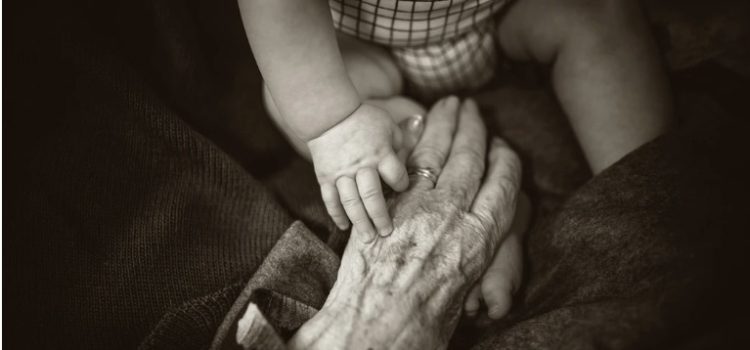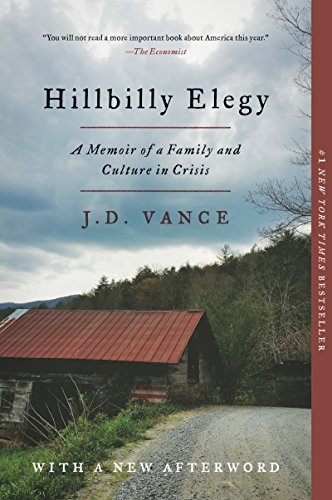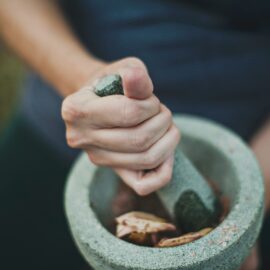

This article is an excerpt from the Shortform summary of "Hillbilly Elegy" by JD Vance. Shortform has the world's best summaries of books you should be reading.
Like this article? Sign up for a free trial here .
What is JD Vance’s “Mamaw” like in Hillbilly Elegy? What impact does Mamaw have on JD Vance’s life?
In Hillbilly Elegy, JD Vance shares the story of his struggles growing up within this culture as a means of articulating a broader social and cultural critique of the Appalachian white working class. Through it all, however, Vance is undeniably proud of where he comes from and clearly loves his family very dearly. JD Vance’s Mamaw plays an especially important role in young JD’s life.
JD Vance’s Mamaw
He credits his maternal grandmother and grandfather (whom he calls Mamaw and Papaw) with saving him from the dysfunction of his nuclear family and instilling in him the attitudes and work ethic that empowered him to rise above.
JD Vance’s Mamaw refused to allow young Vance to succumb to the “woe-is-me” mentality that haunted his community: she encouraged him to work hard, do well in school, and never lower his expectations of himself because of where he came from.
While JD Vance’s Mamaw and Papaw were undoubtedly products of the hillbilly culture, they were also self-aware enough to recognize the drawbacks that it could have on a young person’s outlook. They, instead, exemplified the best of hillbilly culture: its pride in America, its patriotism, its grit and toughness, and its fierce sense of loyalty to family and community.
To fully tell his story, JD has to begin by telling his family’s story. JD Vance’s Mamaw and Papaw were raised in Jackson, Kentucky, which they left in the 1940s when Papaw found work in the Armco steelworks in Middletown, Ohio.
Right from the outset, however, his family history was tinged with the loss, despair, and social dysfunction that would come to define so much of his own experience. JD Vance’s Mamaw and Papaw left Jackson after Mamaw became pregnant as a teenager and gave birth to an infant who tragically passed away just a few days later. This tragedy, along with the burgeoning economic opportunities in southwest Ohio, compelled the young couple to uproot themselves and make their way out of Kentucky.
A History of Violence
As JD would learn from the recounted stories of his aunt, uncle, and mother, Papaw was an alcoholic, and the family soon became victims of his frightening, drunken outbursts.
Vance recalls hearing about how his mother and aunt would know if they father was coming home drunk or sober based on how he parked his car: if he parked it normally, they knew that there would be a relatively peaceful night at home. But if he parked it erratically or hit a telephone pole as he was pulling in, they knew he was inebriated. This would be their signal to run home to warn their mother about the state their father was in and to flee to neighbors’ house for safety.
Papaw inflicted severe trauma on the family while he was drinking. One Christmas Eve, he threw the family Christmas tree out the door (in full view of the children) when Mamaw failed to produce the freshly cooked dinner he demanded.
JD Vance’s Mamaw, though not a drinker herself, was willing to give as good as she got when she retaliated against her husband. One one occasion, she cut his pants with scissors while he was passed out drunk. Other times, she would hide his wallet in the oven. During one fight which Vance’s Uncle Jimmy describes as being particularly violent, Mamaw hurled a glass vase at her husband’s face, splitting his forehead wide open.
In perhaps the most shocking display of all, JD Vance’s Mamaw saw her husband came home drunk, where he proceeded to pass out on the couch. Infuriated, she poured gasoline over him and lit him on fire. It was only through the efforts of their eleven-year-old daughter that he survived.
Eventually, before JD was born, Mamaw and Papaw separated and he moved out of the house. Despite this, they never formally divorced, and would remain entwined in one another’s lives through the shared ties to their children and grandchildren.
While JD Vance’s Mamaw and Papaw themselves lacked formal education and had experienced teen pregnancy, substance abuse, and domestic violence, they always expected that the next generation would do better.
This was core to their belief in the American Dream: that those who worked hard could achieve anything. Mamaw and Papaw, for all their flaws, worked tirelessly to give their children and grandchildren access to opportunities that they themselves never had. Mamaw always encouraged self-reliance: she cautioned JD to never be like the “fucking losers” who thought that their fate was beyond their control.
One day, JD’s mom demanded that JD give her a jar of his clean urine so she could pass a drug test. This floored JD. He saw how completely entitled she was, expecting that he would just help her cheat on a drug test, like it was some basic responsibility he owed her. She was also utterly remorseless at having broken her promise to remain sober.
JD even told Mamaw to her face that she was responsible for Bev’s amoral behavior, arguing that if she’d put her foot down decades ago, Bev wouldn’t be at the low point of asking for her son’s urine. Ultimately, Mamaw convinced JD to relent and give his mother what she needed to pass her drug test.
But this was truly a last straw for both JD and Mamaw. JD could never go back to living with her after what she’d pulled. He moved in with Mamaw, where he would remain until he moved out after high school.
Life With JD Vance’s Mamaw
While the instability and trauma of living with his mother and her men were a thing of the past, life with JD Vance’s Mamaw wasn’t exactly easy. She was a tough old hillbilly who didn’t suffer fools gladly and wouldn’t accept anything less than the best from JD. She made sure he did his homework, kept his room neat, and took out the garbage—and, in characteristic fashion, called him a “lazy piece of shit” when he didn’t.
She was still a still a powerful force for good in his life. He saw her grit, determination, and strength, as well as her compassion and warmth. She was incredibly nurturing and loving with the children in her extended family—JD’s little cousins, nieces, and nephews. He saw that being around children always brought out the best in Mamaw. JD describes Mamaw as the best thing that ever happened in his life, the person who truly saved him.
Soon enough, the stable environment and Mamaw’s no-nonsense style of parenting began to pay real dividends. When JD was in his junior year of high school, he was accepted into the honors math program. Education remained deeply important to JD Vance’s Mamaw, as it had been to Papaw.
Despite the family’s poverty, and her own relative lack of schooling, she made sure JD had an expensive graphing calculator so he could excel in algebra and trigonometry. To Mamaw, this was far more important than JD having a cell phone or trendy clothes. This also deepened JD’s commitment to academics, because he saw firsthand the major investment that Mamaw had made in his education.
A Devastating Loss
JD Vance’s Mamaw passed away from a lung infection in 2005, after years of declining health. JD always described his grandmother as the best thing that ever happened to him. When she died, he lost his greatest champion and the person who probably did more than anything else to save him from the kind of unstable life that his mother had led.
But she had also helped him discover the very strengths that would enable him to endure this loss, move on, and succeed.
Unfortunately, the same couldn’t be said for Bev. Bev’s irresponsibility had put JD Vance’s Mamaw in a perilous financial state during the last few years of Mamaw’s life, as the family discovered to their dismay when they were in the process of winding down the estate. The lengthy stays in rehab and years of unpaid loans to Bev had left Mamaw in a decimated financial condition by the time she passed. As was the case when Papaw died, Mamaw’s passing sent Bev into an emotional tailspin. Once again, Bev began monopolizing the grief and refusing to allow anyone the emotional space to mourn the loss.
———End of Preview———

Like what you just read? Read the rest of the world's best summary of "Hillbilly Elegy" at Shortform . Learn the book's critical concepts in 20 minutes or less .
Here's what you'll find in our full Hillbilly Elegy summary :
- The hallmarks of hillbilly culture and why they hold people back
- How JD Vance broke out of his hillbilly childhood and graduated from Yale
- Why the author thinks hillbillies might be beyond saving







I read the book first, and when the movie “Hillbilly Elegy” was released, I was overjoyed.
You see, I was born in Middletown Hospital in the early ‘40s—needless to say many decades before JD Vance. Like his grandfather, my father worked for ARMCO Steel, which was the American Rolling Mill Company. Because of a college scholarship, I was lucky to leave Southwestern Ohio, but my roots still remain there. Most of my high school friends are still in the area.
Middletown and the surrounding area, including Monroe where I grew up, suffered severely in the late 50s when our steel mills across the country were cutting back. When people can’t work, they feel helpless and turn to drugs and alcohol, and now fentanyl.
The entire area was dependent upon (still is) the salaries from the steel mill. George M Verity, who started the mill in the early 1900s said “I will pin my faith to men.” The unique rolling steel presses that were used at the mill made the steel for refrigerators, cars, and military equipment. Verity was a leader and treated his men honorably, building their houses, and even organizing an ARMCO band. ARMCO Parks in OH and PA (Butler) still pay homage to his focus on family.
I am thrilled that JD Is going to be our vice president and represent the Rust Belt constituents and their struggles—like me, he has lived it. Closing the border and squeezing out the cartels, the fentanyl, and miscreants from all over the globe will be a perfect springboard In solving the rest of our countries immense problems.
Democracy rules! 🇺🇸 Small Government is best! More personal freedoms improve quality of life. 👍